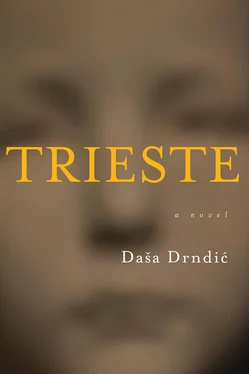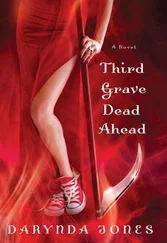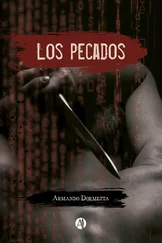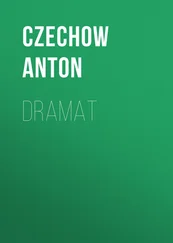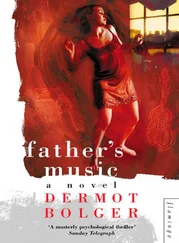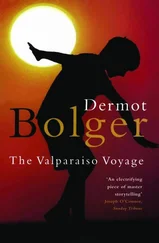Is not your time
as irreversible as that same river
where Heraclitus, mirrored, saw the symbol
of fleeting life? A marble slab awaits you
which you will not read. On it, already written,
the date, the city, and the epitaph .
Other men too are only dreams of time,
not indestructible bronze or burnished gold;
the universe is, like you, a Proteus .
Dark, you will enter the darkness that awaits you,
doomed to the limits of your travelled time .
Know that in some sense you are already dead .
Borges
The war ends and what is left of the Baar family returns to Gorizia, to the new border rife with invisible malignant cells resembling particles of atomic dust. Along that border, as along all borders, deep into the soil is thrust the steel axis of a Ringelspiel, a merry-go-round, a lively carousel doomed to repeat eternally the invidious drama of family sagas. History — that lying, traitorous mother of life — continues, logorrhoeically, to spin its tiresome story, secretly dreaming up new borderlands one after another. And a border, like every long, deep wound, even if it heals and does not turn into a wellspring of putrid stench, is streaked with proud scar tissue that separates the living from the dead. A border is a “land” of spirits howling as they seek a form to assume.
Ada finds a job in a stationery shop at the intersection of Seminario and Ascoli streets, near to what was once the Jewish ghetto. It is a small shop. From the ceiling hangs the dead Monarchy, so through the little shop spreads the past, burning down just as sticks of oriental incense gradually snuff out, turning into small mounds of light-grey ash. The shop has something of everything: newspapers in Italian, German and Slovenian, red and yellow sweets in thick jars through which the sun shines, capturing the sweets in its everlasting, loving embrace, chains for pocket watches, cheap cologne, tobacco from every place imaginable, an assortment of baubles, chocolates, razors, buttons, threads, pocket mirrors, combs that tuck into the pocket of a military uniform. Florian Tedeschi certainly has reason enough to frequent such a shop.
Gorica is now Gorizia, rather than Görz. Thus, Ada’s shop is visited more and more often by the soldier Florian Tedeschi, stationed at the garrison barracks on Via Trieste, at the east end of town, near the border with the Kingdom of Serbs, Croats and Slovenes.
The year is 1920. Politically and economically Italy is twisting and flapping like a flag snapping in a powerful gale. There are scuffles and clashes with police. Half a million workers take part in strikes that last nearly to the end of the year; 320 people are killed in the first six months. The harvest rots in the fields. The wine is bad. Ada has no idea of any of this, she thinks how she will unbraid her hair at precisely the moment when she catches sight of Florian Tedeschi crossing the street on his way to the door over which the little brass bell might announce the beginning of a new life, ding-a-ling. With her finger on the golden-yellow wooden countertop steeped in the fragrance of tobacco, the fragrance of honey and cherries, Ada traces out her future. A smile of close-held happiness and anticipation, rolled up in a ball, like the bell on the door, swings on her face. Though coming to them late, Ada is reading the plays, novels, poems and letters of Gabriele D’Annunzio, grand lover and seducer, a man barely five foot tall, a bald, one-eyed warrior with a little moustache like the tail of a frail swallow, a decadent with rotting teeth, a media manipulator, a pilot and a shyster, a cavalry officer, a champion of her Gorizia, a rumour addict and petty dictator, a Blackshirt. When the family comes home from the camp she happens upon all the books that had belonged to her mother Marisa who disappeared so mysteriously; there they are, untouched, on a shelf above the shelves with the walnuts and the flour for the macaroons. under the counter in the shop, out of view, Ada leafs quickly through a life that will pass her by. With her free hand, as she reads, she crumbles a slice of Gugelhupf purchased at the neighbouring bakery owned by Frau Arughetti, who forgot to leave town. Elusive images flick through Ada’s mind; she snatches at them, her breathing jagged, and the windows fog up at the La Gioia stationery shop in the winter evenings. For her — just as for virgins and mothers all over Italy into whose dark labyrinths of repressed lust strode that very same lover whom Paris greeted, ecstatically blind, arms and legs wide open — the borders between poetry and reality were erased with the smudge of a cheap eraser. Ada keeps the Toscanelli cigars, His favourites, in a special spot, under glass. Ah, all the actresses, duchesses, dancers; all the poets, journalists, singers and marquises whom He gets to know and love long after His first forays to local brothels at sixteen (when He pawned His grandfather’s watch); ah, Teodolinde and Clemenze, and Giselda Zucconi, and Olga Ossani; Maria Luisa Casati Stampa, amasser of exotic animals and bizarre furniture; oh, Ida Rubinstein, Isadora Duncan, the singer Olga Levi Brunner, and after her, the pianist Luisa Baccara, then wealthy American painter Romaine Goddard Brooks, who later comes out as a lesbian; then, oh Lord, celebrated Eleonora Duse; Elvira Natalia Fraternali Leoni, Contessa Natalia de Golubeff, who dies in 1941 from alcohol and poverty (for whom Ada, long since married to Tedeschi, cared not at all); Maria Gravina Cruyllas di Ramacca, mother of four sons who bears Gabriele a daughter, Renata; Giuseppina Mancini Giorgi, 1908, committed to a mental hospital; and just then, in 1920, Parisienne Amélie Mazoyer, still a hot item. Morphine addict Alessandra Carlotti di Rudinì, dubbed Nike, is another of them: after her brother and children die she takes her vows and dies a Carmelite in 1931. And Maria Harduin di Gallese was there all along, of course, as D’Annunzio’s lawful wedded wife.
Ada reads Il trionfo della morte, La figlia di lorio, Canto novo, II piacere, L’innocente, Terra vergine, Le primavera della mala pianta, Il fuoco, so she has no time to read the newspapers, meanwhile in the little town of Fiume people are strutting around sporting their newly tailored black shirts, and D’Annunzio, “il deputato della belezza”, recites his poems from a balcony, champagne flows under the blaze of fireworks, and syphilis spreads. In July 1920 rats come pouring out of the Trieste sewers: there are squadristi crawling all over the city. They set fire to the building of the Slovenian National Home. Agrarian Fascism is born. Trucks packed with squadristi come to villages at night, twenty of them, a hundred. Armed with guns and revolvers, they surround the houses of members of the Farmers’ League and left-wing unionists and, systematically, one by one, order the head of each household to step out, and if they have to wait too long, they say: Don’t toy with us, we’ll set fire to your home with your wife and children inside, and then out he comes, and they tie him up, throw him into the truck, take him to a secluded spot and beat him senseless; then they leave him tied to a tree somewhere, unconscious and naked. Fascism sweeps the masses as if they were caught up at a football match. In her lovely light-blue jacket, in yellow stockings and petite yellow shoes, which many years later Florian will remember with longing, Ada often visits her lover at his barracks on Via Trieste on the east end of Gorizia, near the Yugoslav border. When she isn’t reading D’Annunzio and when her bare bottom isn’t rubbing against Florian’s army blanket, Ada is out on a bicycle, for bicycling is a healthy sport because it strengthens the calves. And so it is that a new joie de vivre creeps into Ada’s soul like a moth into a trunk of woollens. Those were the happy days in my life of suffering, Ada would say to Haya in 1943, and maybe in 1944, too.
Читать дальше
